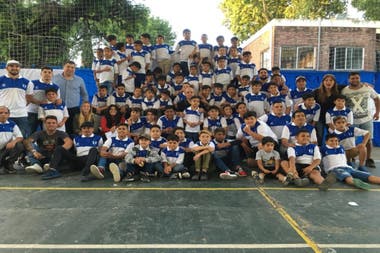For many women it is difficult to realize that they are in a violent relationship and, above all, to be able to ask for help. Often the attacks can start as almost “imperceptible” and its dimension becomes aware when it is too late. The specialists emphasize that all violence is serious due to the consequences that it generates on the physical and emotional health of women, but the risk increases in cases where physical or sexual violence is prioritized, and may culminate in femicides. Being able to detect warning signs, prevent and act on time is key.
- All women can be victims of violence. Not only does it not distinguish by socioeconomic or educational status, but it can occur at any time in a woman’s life. Alejandra Vázquez, a psychologist specializing in family violence and a member of the civil association Surcos, highlights that many times it is about daily abuse, in many cases, naturalized. For example, a violent courtship “has all the ingredients to become invisible,” describes the specialist. To the lack of experience and the young age of the victims, the idea of romantic love is added, “that she can do everything and forgives her”; the difficulty of recognizing the situation and recounting it, and the loss of the containment network.
Marcela Morera, from Crossed by Femicide, explains what signs to pay attention to
Warning signs
For girls and women:
- Control: from telling you what clothes you can wear and how to put makeup on, to check your cell phone and ask for your Facebook, Twitter or Instagram password as a “token of love”.
- Humiliation: ridiculing yourself in front of your friends, making you feel awkward, useless, criticizing your body or comparing yourself to your ex-girlfriends, making you feel less and blaming yourself for everything that happens in the relationship. Many times, these men behave in one way in public and in a very different way in private. In addition, they often ask for forgiveness many times. “After a violent situation, they apologize, they promise not to do it again. This is confusing, because violence coexists with love situations, and that generates hope in her: the thought that she will be able to change it,” explains Vázquez.
- Celotype: When he doesn’t let you see your friends, he wants to know your every move and controls your outings as well as your social networks. “Many times, the violent ones do not even let them get together with work or school colleagues in the case of adolescents,” exemplifies Marcela Morera, co-founder of the group Atravesados por el Femicidio.
- Physical aggressions that in the sight of those around them are interpreted as “sleight of hand”: such as pinching, pulling hair, pushing, kicking, or slapping. This usually occurs in abusive relationships in teen dating.
- Sexual abuse: If it forces you to have sexual relations, it wants to touch you or carry out practices that you do not want or feel that you are not prepared, as well as forcing you to have sexual relations without using a condom.
Violent dating: the hidden dangers behind a fake romantic love
For families:
- Isolation: if they notice that their daughter begins to avoid friendships, she distances herself from the family, restricts her activities (such as studying, going out or playing sports) and all she does is be with her partner. “The violent man will try to distance her and isolate her all the time of friends, study or work companions, family, because they are the ones who can open her eyes, give her some kind of help or make it clear that this man exercises violence on her, “Morera points out.
- Cell phone earrings: she spends all day glued to the cell phone, turning on the speaker to show her boyfriend that she is in a certain place or who is with her.
- Change in the way of being: You don’t dress the same way, you stop wearing clothes you used to like, you lose or gain a lot of weight; if you are distressed, with low self-esteem or with changes in mood. “We are going to be detecting in these women from changes in habits to their look and the way of grooming, as well as in the brightness of their eyes, their look, their rictus and personal cleanliness,” Morera describes.
- They avoid talks: if they notice that she begins to hide things and does not tell too much about their relationship or if she closes in on herself and does not want to talk about what is happening to her. Ada Rico, president of La Casa del Encuentro, points out that it is key that parents talk a lot with their daughters, in a non-censorious dialogue, “because if the adolescent feels the censorship she will not speak anymore,” although it is difficult to understand why your daughter is in a relationship that hurts her. And he adds: “What must be avoided is that the adolescent is left alone. The femicide does not start to do violence overnight. It all starts in the courtship.”
What are the types of violence and in what areas can they occur?
From Fundación Avon, they emphasize that it covers all conduct, action or omission that, directly or indirectly based on an unequal relationship of power, affects the life, personal security, freedom and dignity of women, as well as any discriminatory practice that put women at a disadvantage compared to men.
Where to report and ask for help
More information
- The line 144 It operates 24 hours, 365 days a year and is attended by specialists in the field who provide advice. In addition, it is anonymous, free and national. It is possible to contact by mail at [email protected] and by WhatsApp at (+54) 1127716463. You can also download a free app to your cell phone by searching 144 from the Android or App Store.
- The Ministry of Human Development and Habitat of the City designed an online test that allows through simple and concrete questions to detect behaviors of control, domination and disqualification in courtships. Take the test.
La Casa del Encuentro: provides counseling and support to women who suffer violence and relatives of femicide victims. [email protected] Emergency telephone number: (011) 15-5997-8955.
Grooves Civil Association: they work in the promotion of health and prevention with workshops, providing tools for the construction of equal relationships in young people. On Facebook: @SurcosOrg
Crossed by femicide: a group made up of family members from all over the country that creates networks for mutual containment and support.
.
Publicado en el diario La Nación




